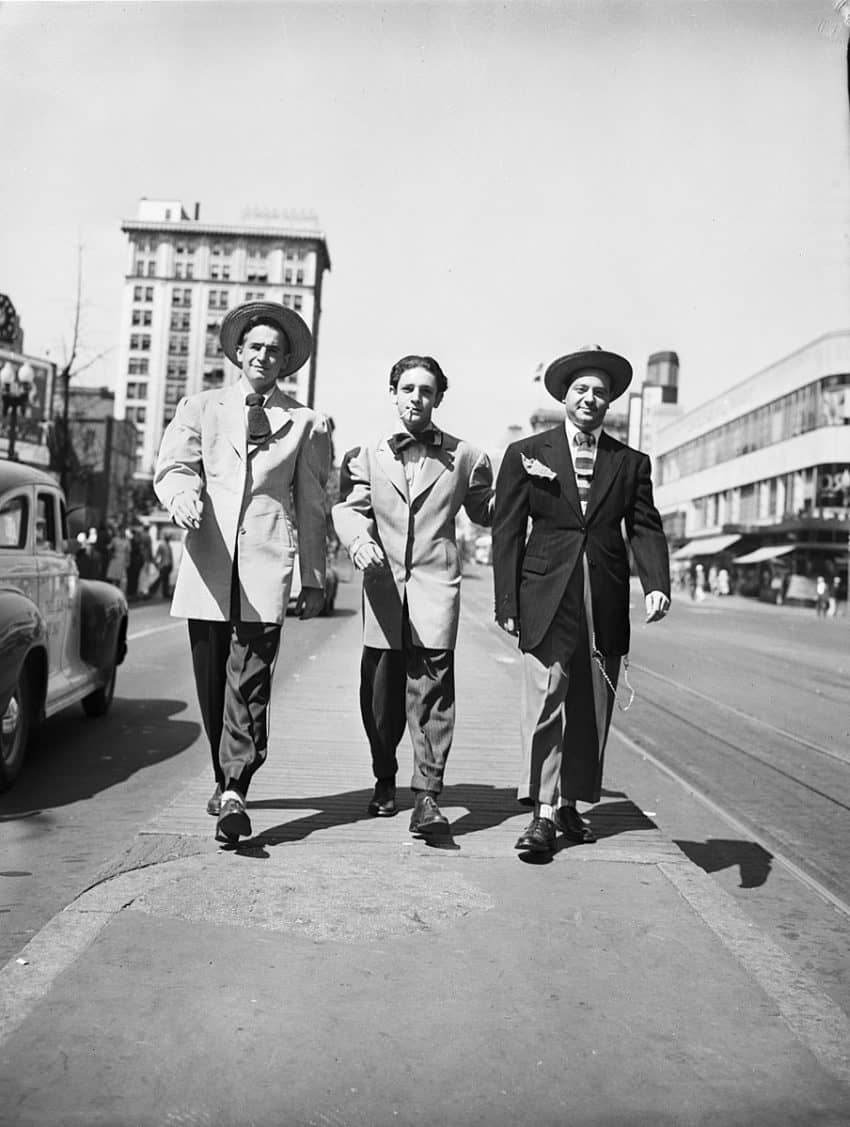
Zoot Suits, which became popular during World War II, were criticized because they used excessive amounts of cloth, supposedly hindering the war effort. As a result, some servicemen rioted against wearers of the outfits in 1943. Wikimedia. For more information click this link. Click on photo to enlarge.
By: Phil Kohn. Dedicated to the memory of his father, GM3 Walter Kohn, U.S. Navy Armed Guard, USNR, and all men and women who have answered the country’s call in time of need. Phil can be contacted at ww2remembered@yahoo.com.
The British House of Commons on June 4, 1943, rejects any lifting of the economic blockade of occupied Europe. Luftwaffe bombers attack the massive Russian tank factories at Gorki. A military coup, led by Gen. Arturo Rawson and Col. Juan Peron, takes place in Argentina, with the Army occupying Buenos Aires. Gen. Henri Giraud is appointed commander-in-chief of Free French forces, leaving Charles de Gaulle free to pursue political leadership of the (Free) French. On the streets of Los Angeles, California, the “Zoot Suit Riots” between U.S. Navy sailors and Marines and Latino youths begin. Members of the military attack Mexicans wearing the flamboyant attire. The servicemen consider the wearing of zoot suits to be unpatriotic because the garments’ generous use of cloth (wide shoulders, long jackets, broad lapels) is a violation of the wartime cloth-rationing laws. In fact, it is illegal to manufacture zoot suits, but clandestine tailors produce them anyway, as demand is high in Mexican and African-American neighborhoods.
German submarine U-513 sinks four ships off the coast of Brazil on June 5. Pierre Laval, the puppet head of government of German-occupied France, announces that an additional 200,000 French citizens are needed to assist in war work in Germany. In Tokyo, a state funeral is held for Adm. Isoroku Yamamoto. The German slave-labor camp at Mińsk Mazowiecki, Occupied Poland, is shut down; the 150 Jewish workers who remain are executed.
On June 6, the new French Committee of National Liberation, in a radio broadcast from Algiers, Algeria, pledges to abolish “arbitrary powers” assumed by the Vichy government, and to restore “all French liberties, [and] the laws of the Republic.” In the U.S., Count Fleet wins the Belmont Stakes, capturing thoroughbred horseracing’s Triple Crown. (The horse had previously won the Kentucky Derby and the Preakness Stakes.)
In an effort to quell the continuing Zoot Suit Riots in Los Angeles, the military on June 7 confines all sailors and Marines to their barracks until further notice. In addition, Los Angeles is declared off-limits to all military personnel. While this action stops the Los Angeles rioting, similar attacks against wearers of zoot suits begin in San Diego, Oakland, Chicago, Detroit, New York and Philadelphia. In the latter city, two members of drummer Gene Krupa’s popular dance band are beaten up for wearing the band’s zoot-suit stage costumes on the street during a break.
On June 8, Japanese forces suddenly begin withdrawing from Kiska Island, in the Aleutians, their last foothold in the Western Hemisphere. Ammunition in the magazine of the Japanese battleship Mutsu explodes while the ship is anchored at Hashirajima, an island in Hiroshima Bay. The explosion kills 1,222 people, including 1,121 of Mutsu’s crew of 1,474 sailors.
In Yugoslavia, anti-Nazi Partisan leader Josip Broz Tito on June 9 is wounded in a German air attack. In the U.S., the government authorizes the first deductions from paychecks for income-tax withholding. Previously, people paid taxes on their salaries in a lump sum at the end of the tax year.
A British-American, coordinated air offensive — “Operation Point Blank” — is begun against major German cities on June 10. The U.S. Eighth Air Force conducts precision-bombing missions by day, and RAF Bomber Command flies area-saturation missions by night. The Berlin Gemeinde — the last Jewish hospital in the German capital — is closed. The 200 employees and 300 patients are sent to the Theresienstadt concentration camp in Terezin, German-occupied Czechoslovakia. László Bíró, a Hungarian Jew who fled to Argentina to escape the Nazis, files a patent in Buenos Aires for his invention: the ball-point pen.




